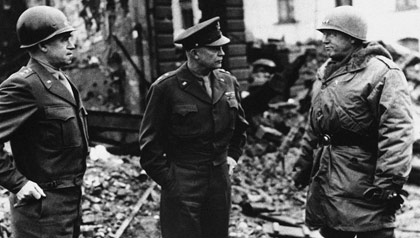AARP Hearing Center


Contrary to popular myths about the inevitability of an Allied triumph on the Western Front in World War II, the surprise German counter-offensive that surged out of the Ardennes Forest in December 1944 was not the desperate gambit of a beaten foe. In fact General Dwight D. Eisenhower, supreme commander of the Allied Expeditionary Forces in Europe, feared the mass attack might well win the war for Germany. He had to figure out a way, and quick, to repel the Wehrmacht in the ensuing Battle of the Bulge, then set the bloodied (and increasingly fractious) Allied juggernaut back on the road to victory.
That dire scenario is just one of the corrective insights that Jonathan W. Jordan offers up in Brothers, Rivals, Victors, his hefty page-turner on the complex, decades-long interplay among America’s top three wartime commanders. In addition to Eisenhower (the savvy political consensus-seeker) there was General Omar Bradley (the painstaking infantry commander) and General George S. Patton (the greatest offensive genius in the history of warfare, according to certain of his peers). Subtitled Eisenhower, Patton, Bradley, and the Partnership that Drove the Allied Conquest in Europe, the book provides fresh perspectives on how the men cooperated between and among themselves. Describing the relationship between Patton and Bradly, Jordan writes, “Their instincts were, more or less, predictable and harmonious, like a pair of temperamental musicians working different instruments to create a surprisingly good melody.”
Surprisingly good for most of the symphony, that is. Mining a trove of personal diaries, new research and contemporary accounts, Jordan shows just how deeply the troika’s professional criticisms, resentments, jealousies and mutual disdain also roiled their days; undermined their genuine comradeship and mutual respect; and complicated their decision-making.
Although Jordan portrays Eisenhower, Patton and Bradley as the principal players on the Western Front, other intriguing characters spur the action as well. British Field Marshal Bernard Montgomery, for one, routinely jeopardized Allied unity, causing Eisenhower many sleepless nights. The Americans regarded Monty as vainglorious and pompous, constantly conniving to use American troops to shore up weaknesses in his own positions. At the same time, however, they acknowledged his devotion to the Allied cause and respected his war record. It was Monty, after all, who had beaten the seemingly invincible German Field Marshal Erwin (the “Desert Fox”) Rommel at El Alamein in 1942.




































































More From AARP
Mambo in Double Time: The Beat Goes On
In Beautiful Maria of My Soul, Oscar Hijuelos returns to the story played out in the Mambo Kings.